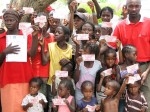 In a remote part of Namibia simply giving people a basic monthly income, funded with tax revenues, of 100 Namibia dollars, or about €9 ($13), for each citizen is working systemic change. There are no conditions, and nothing is expected in return. It sounds like a communist utopia, but a basic income program pioneered by German aid workers has helped alleviate poverty in a Nambian village. Crime is down and children can finally attend school. Only the local white farmers are unhappy.
In a remote part of Namibia simply giving people a basic monthly income, funded with tax revenues, of 100 Namibia dollars, or about €9 ($13), for each citizen is working systemic change. There are no conditions, and nothing is expected in return. It sounds like a communist utopia, but a basic income program pioneered by German aid workers has helped alleviate poverty in a Nambian village. Crime is down and children can finally attend school. Only the local white farmers are unhappy.
The pilot project is taking place in Otjivero, a settlement of 1,000 inhabitants in a hot and dusty region 100 kilometers (62 miles) east of Windhoek. The village, home to people as thin as their livestock, has one school and one clinic. Until recently, the unemployment rate was over 70 percent, 42 percent of children were malnourished, and few children attended school. Instead, the place had a reputation for alcoholism, crime and AIDS. Otjivero is surrounded on all four sides by the electric fences of rich, white farmers like Lüttwitz. The settlement offers a cross-section of a society with people at the bottom and people at the top, but little in the middle. Otjivero is a microcosm of Namibia, Africa and the world.
In other words, Otjivero is the perfect place to test ways to make the world a more just place.
Under the plan, every citizen, rich or poor, would be entitled to it starting at birth. There would be no poverty test, no conditions and, therefore, no social bureaucracy. And no one would be told what he or she is permitted to do with the money.
Visit the English language version Der Spiegel which describes the success of this outside the box approach to eliminataing poverty

I believe Milton Friedman and I know other conservative economists have advocated giving money straight out, rather than means tested services and vouchers, for years as the most efficient and socially respectful solution. Good to see it in action, working as expected.